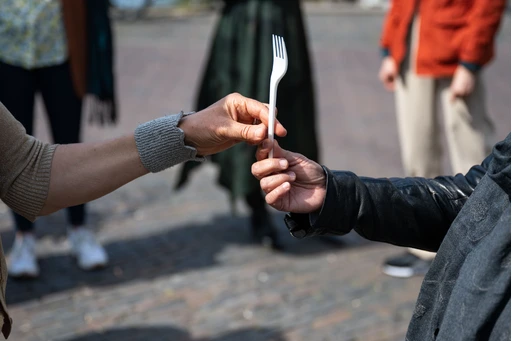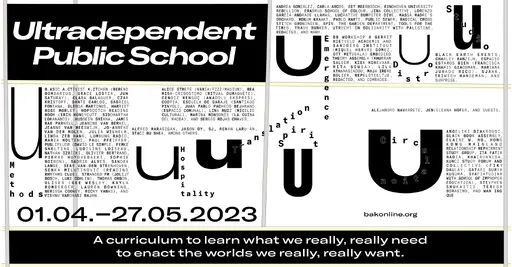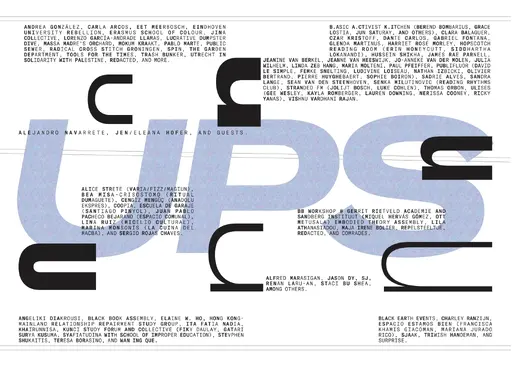
Opening: 19 May 2023, 12.00 hrs. This three-day gathering explores the space that opens between language justice and ultratranslation. It brings together friends, academics, activists, language workers, social justice workers, and cultural workers—individuals and collectives—from here and elsewhere.
They are bodies that turn the everyday life problem of language into practices of resistance. Through trainings, performances, screenings, presentations, gatherings, demonstrations of better practices in translation and interpretation and conversation, this symposium proposes to open flows of relation. It may fail to answer questions or posit solid analysis. Rather, it hopes to ground a commitment to devour and recreate language from the inside. It points our the necessity not of language but of languages—in other words, the many different ways to name our worlds.
“Language and world are inseparable. Language and action are inseparable. Weuse language to think about the world: the world being language. We turn our minds and bodies to the language we are using: aware of the constant constraints and impositions of that language upon us. The language being the world, its multiple and multiplicitous brutalities. The perpetual brutalities of an unjust . The perpetual possibilities of justice in language.”
A Manifesto for Discomfortable Writing, Antena Aire
Ultratranslation is concerned with increasing literacy, collective skills, and institutional commitment around language justice. It is convened by cultural worker Alejandro Navarrete and language justice worker Jen/Eleana Hofer.
To attend the symposium you can register here.
FRIDAY MAY 19
Language Justice Basics: Equitable Communication for Multilingual Conversations
Participatory workshop | 13:00 – 17:00
Facilitator: Jen/Eleana Hofer | Language: English
In a multilingual and multicultural working context, which concepts and strategies can we use to create genuine spaces for cross-language communication? How do we learn to attend to one another differently, beyond the boundaries of the dominant language and the dominant culture? Language justice, at heart, centers on equitable communication: practices that support each person’s capacity to communicate authentically in their language(s), and hence to participate fully in the contexts where they work, live, think, and interact. This participatory workshop offers an introduction to the concepts and practices of Language Justice and provides tools for creating dynamic and well-functioning multilingual conversations, both remotely and in person. Held in English.
All Q No A: Opening Performance
Improvised intuitive guided tour of ultrasympathetic ultratranslation
Docent: Jen/Eleana Hofer | 17:30 – 19:30
Language: English
When you hear the terms “language” and “justice” in proximity, what are your thoughts, feelings, imaginings? When you think about communicating across language difference, what are your curiosities, fears, excitements, desires? When is language a barrier or cage or colonizing force; when is language a porous membrane or offering or a liberatory practice? How do our bodies incorporate language, integrate it, spit it out? Jen/Eleana Hofer will facilitate a session for questions that inspire more questions, and responses-without-answers: part talk, part conversation, part performance, part intuitive guided tour of language justice thinking and practice and ultrasympathetic ultratranslation.
SATURDAY MAY 20
11:00-11:30 Welcome Remarks
Participants: Maria Hlavajova, Clara Balaguer, Alejandro Navarrete | Language: English
11:30-13:00 Conversation: Many Tongues: Multilingualism Inside Our Languages
Participants: Coloredqollective, Nikoline van Harskamp, Paolo Caffoni | Language: English
The relation between geopolitical borders and language is a fiction created by the Nation-states and it has no current correlation anymore. We need to think on the possibility of an imaginary infrastructure in our actual post-Babel state to consider languages not only in the rigid terms of the Grammar, but as a possibility for contamination and contagion where languages influence each other through their intonations, accents and multiple voices. In other words, to encourage the anarchist nature of the language.
13:00-14:00 Conversation: Decolonizing Translation, Reterritorializing Translation (Part 1)
Participants: Yásnaya Elena Aguilar Gil and Rolando Vázquez
Languages: English and Spanish
What if we were to conceive of translation as a vapor or fog rather than a map or a bridge? What if we were to experience translation as a way to unlearn rather than learn? As a way to abandon unhealthy patterns of reproducing colonial gestures in our language and a source of repair cultural and linguistic fractures? Translation and other cross-language practices are neither a reification of the essence of the “original” as sacrosanct and immutable nor a direct linear transmission of information about one culture to another. The snags and messinesses and errors and misunderstandings and unknowings and uncertainties at the heart of translation practice make us more human, make us porous and vulnerable to one another, invite us to call ourselves into question as we encounter something more or other than ourselves. Where might such an imagining of translation live? In what land, in which bodies, in which spaces between which people, words, practices, actions?
14:00-14:30 Coffee Break
14:30-16:00 What is Language Justice, To You, In Concept and Practice?
Multilingual conversation on Zoom
Participants: Erin Sanders-Sigmon, Gloshanda Lawyer, Jen/Eleana Hofer, Yaya Laureano
Languages: ASL, Dutch Sign Language, English, Spanish
In this conversation, you will notice English – a dominant language the world over – being used as a “pass-through” language to enable communication among people who use non-dominant languages. You will also notice the way we frame communication at the start of our conversation, through the language justice intro the interpreting team shares to make sure everyone knows how to participate in this event in their language. Part of that intro says:
Language lives in our bodies and cultures as a manifestation of colonial histories and resistances to colonization. We recognize our use of colonial languages at this event, and honor the languages that have been lost or invisibilized due to the violence of colonization. We also recognize the liberatory uses of our colonial languages to create change and connection.
Language and communication are part of everything we do and every relationship we form, from our most intimate connections to the most expansive instances of collectivity. How can we use communication equity to transform our relationships and, little by little, our culture? This conversation will share big dreams and concrete everyday details about how language justice can work, in practice, to reframe communication as a tool for liberation and connection.
16:00-16:30 Q&A-plus: Deconstructed Multilingual Conversation
Guide: Jen/Eleana Hofer
Language: English
What did we just witness? How was the multilingual panel we experienced this afternoon put together? What practical strategies do we use to create equitable and open communication across spoken and signed languages, and across language differences within those modes? What are some of the political, ethical, and relational touchstones that guide our decisions around multilingual communication? Audience questions about the language justice panel will guide J/E’s remarks.
16:30 – 17:00 COFFEE BREAK
17:00-18:00 Conversation: Decolonizing Translation, Reterritorializing Translation (Part 2)
Participants: Allison Yasukawa and Rolando Vázquez
Language: English
What if we were to conceive of translation as a vapor or fog rather than a map or a bridge? What if we were to experience translation as a way to unlearn rather than learn? As a way to abandon unhealthy patterns of reproducing colonial gestures in our language and a source of repair cultural and linguistic fractures? Translation and other cross-language practices are neither a reification of the essence of the “original” as sacrosanct and immutable nor a direct linear transmission of information about one culture to another. The snags and messinesses and errors and misunderstandings and unknowings and uncertainties at the heart of translation practice make us more human, make us porous and vulnerable to one another, invite us to call ourselves into question as we encounter something more or other than ourselves. Where might such an imagining of translation live? In what land, in which bodies, in which spaces between which people, words, practices, actions?
18:00 – 19:30 DINNER BREAK
19:30-21:30 Ultratranslations: Performances, Projections, Readings
Projection: “Contagious Speech,” Nicoline van Harskamp | 19:30 – 20:15
Performers: Dani Zelko, JD Pluecker, Jen/Eleana Hofer, Soraya Maicoño, Ultra hospitality students | 20:30 – 21:30
Languages: performances may take place across multiple languages, interpreted or not, at the performers’ discretion
21:30 – 22:30 DJ Music & Drinks
SUNDAY 21 MAY
14:30 – 16:00 Ultrasympathetic Unofficial Office Hours
Individual or small group conversations/consultations with Jen/Eleana Hofer
Language: English (meetings can be held in Spanish as well)
Do you have questions about multilingual communication or communication equity? Want to nerd out about interpreting or translation? Have an idea or challenge regarding language justice or language experimentation that would benefit from another person’s eyes, ears or brain? J/E will be available for small group or individual conversations in person or remotely with anyone who wants to chat about any/all of the topics of the symposium. Zoom link to connect remotely:bit.ly
16:00-17:00 BREAK
17:00-19:30 Ultratranslation Manifesto Rewrite
Participatory collective writing session
Language: English and self-interpretation from other languages
Join Jen/Eleana Hofer and JD Pluecker, who collaborated for ten years as Antena Aire and co-wrote the Manifesto for Ultratranslation in 2014, in reimagining and rewriting the manifesto based on how we are thinking, feeling, experiencing and dreaming ultratranslation at this time. Not quite sure what ultratranslation is, even after this weekend’s symposium? That’s the perfect place to start to articulate what it might be. Does ultratranslation seem to slip into different forms and bodies and manifestations every time you attempt to practice it? Does it seem impossible to capture within the confines of language? Exactly so! Ultratranslation invites us to find the possible inside the impossible and to language that possibility even as language never quite gets us where we need to go.
Participate remotely or in person. Zoom link to connect remotely:bit.ly
Note
BRING YOUR OWN HEADPHONES TO CONNECT TO THE DIFFERENT LANGUAGE ROOMS
All days are open to the public unless otherwise stated.

